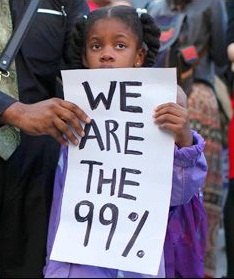 NEW YORK | In four weeks, the Occupy Wall Street (OWS) movement has placed itself at the center of the American politics debate. As satirist and TV host Jon Stewart said in his Daily Show, it has caused the media to move its coverage dial from “blackout” to “circus”.
NEW YORK | In four weeks, the Occupy Wall Street (OWS) movement has placed itself at the center of the American politics debate. As satirist and TV host Jon Stewart said in his Daily Show, it has caused the media to move its coverage dial from “blackout” to “circus”.
Reporters from all the major networks have gone to Zucotti park to talk to the protesters. The president Barack Obama and lawmakers are talking about their anger against bank bailouts and income inequality. Large labor unions, including the AFL-CIO and SEIU, have joined them. Even a corporate board has shown support: Ben & Jerry's directors released a statement “to express our deepest admiration.”
The protesters claim they are neither Democrats nor Republicans; rather, Americans who are disenchanted with both parties. However, both parties know this event will have an effect on the 2012 elections, and Democratic Party has embraced the movement.
For Timothy Kelly, journalist of Fox News, the OWS movement destroys honest debate:
“The OWS crowd demands respect but offers nothing but contempt and deception. When confronted with this assessment they retreat into condescending rhetoric about this movement being beyond the understanding of their critics. There has never been any serious dialogue and I suspect there never will be any. In any serious dialogue, this group would cease to exist.”
AWR Hawkins in Big Government points out that the protesters are “little socialists” and “the products of the class-warfare”:
“The hippies are still sleeping on the ground down by Wall Street, defecating who knows where, dragging their tarps from street corner to street corner and having sexual relations out in public. (I guess it’s kinda like Woodstock, minus the bad music.)
News commentator Ann Coulter says that demonstrators have embraced “demonic aspects” and compared them to a possessed man encountered by
Christ in the gospels.
From the liberal perspective we find Paul Krugman, who claims that all these excessive criticisms for a few thousand protestors on the right wing show the plutocrats “panic”:
“The way to understand all of this is to realize that it’s part of a broader syndrome, in which wealthy Americans who benefit hugely from a system rigged in their favor react with hysteria to anyone who points out just how rigged the system is”.
Huffington Post's Senior Editor Paul Brandeis believes a lot of lip service has been paid to the idea that Occupy Wall Street lacks focus:
“More specifically, what moves Wall Street, and what Wall Street wants is not money for the middle class of America, and certainly not money for the poor of America — what moves Wall Street is money for themselves. And this seems to me to be the problem. Most of us still are happy that we live in a capitalistic system, especially those of us who value freedom not guaranteed under the experiments with socialism we saw in the 20th century. A capitalistic system requires something like a Wall Street to exist. Yet, for a capitalistic system to work for all of society, we need a Wall Street that has what Cornel West calls “moral maturity.”
The New York Times' Mark Bittman, considers that a movement that questions everything — from food justice to economic justice — is a fine start:
“It’s not just young people, as the We Are the 99 Percent tumblr reveals (/). These are the stories, writes Washington Post columnist Ezra Klein, of people who played by the rules, did what they were told, and now have nothing to show for it. How many Americans fall into that category, and how many more are on the precipice? (…) and if Occupy Wall Street can push the Democrats as the Tea Party has pushed the Republicans … well, hooray”.
Has Wall Street has been excessively blamed?
Some executives are actually saying that, much like the protesters, they’re also anxious and angry, but for other reasons: for them, there isn’t enough global stability, leverage or risk appetite to triumph in the current slump due to government interference and persecution.
Dear readers, feel free to comment…




